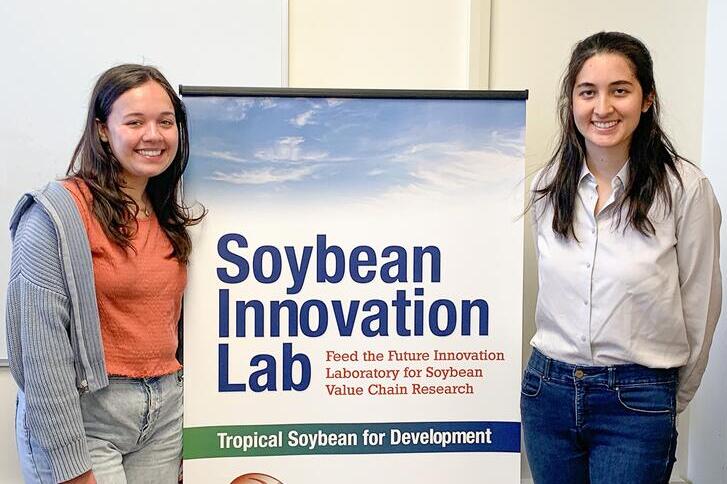ACES internship program supports undergraduates’ international research

Global collaboration is integral to the work of many researchers in the College of Agricultural, Consumer and Environmental Sciences (ACES) at the University of Illinois Urbana-Champaign. Undergraduate students who are interested in international research have many opportunities to be involved, and it doesn’t always mean traveling to faraway destinations — the work can be part of their daily activities on campus.
Olivia O’Leary, senior in agricultural and consumer economics, is a Global Food Security Intern, a program offered through the college’s Office of International Programs (OIP).
O’Leary works with the USAID Feed the Future Soybean Innovation Lab (SIL), housed in the College of ACES. Under the supervision of Annette Donnelly, SIL visiting research specialist and program manager, she analyzes yield data from smallholder soybean farmers in Kenya to help identify areas for improvement.
“I’m interested in international work and food security, so the internship combines two things I’m passionate about. I’ve gained experience working with Excel, which helps me in my classes,” O’Leary said. “I also like to attend meetings in SIL, which gives me a better idea of what they do and how it works. In addition, my program manager is a mentor for me, helping me not just with my work but also general career advice.”
Kierstin Benson is also a global food security intern at SIL under the guidance of Michelle da Fonseca Santos, assistant director of SIL, and Josy Francischini, Pan-African Trials commercialization manager with SIL based in São Paulo, Brazil.
“Currently, we're working on commercialization of products in western Africa. We put information from the scientists into digestible spreadsheets and materials for seed buyers and producers. Josy and Michelle travel abroad and present this information to governments and buyers, showing people how they can move forward with seed innovation to produce higher yields in areas that are affected by disease, bad weather, or low-quality soil,” Benson said. “This is actual data for soybeans that are being tested in the lab right now. It’s giving me real-world experience that I wouldn’t get in the classroom.”
Benson is an agricultural and consumer economics major with a concentration in public policy and law. She also has a minor in political science and plans to add another major in food and environmental sustainability.
“I'm from Aledo, Illinois, which is a very small town. I know what it's like to be an Illinois soybean farmer. But what is it like for people in Africa or Brazil and how are those markets changing? Being able to hear other people's perspectives on the global food economy and looking at food on a global level has been really eye-opening,” she added.
The Global Food Security Interns Program supports ACES undergraduate students to pursue work related to food and nutritional security in low- and middle-income countries. The program is funded by the Arlys Conrad Endowment Fund, and it is open to students and faculty from any department in ACES.
“We provide the student's salary to be an hourly undergraduate researcher with a faculty member on a topic related to global food security. If international travel is required as part of the research, we'll also provide a stipend for that,” said Lauren Karplus, assistant director of OIP.
The interns also meet as a cohort throughout the semester to discuss global food security issues in a broader perspective, and they have opportunities to engage with global food security experts in addition to their individual research projects. For example, O’Leary and Benson attended a meeting on campus with representatives from the United States Agency for International Development (USAID).
“It was really nice because the people from USAID were very eager to give advice and tell us more about their work and how they ended up on that path. I enjoy going to those events and learning from professionals in the field,” O’Leary said.
Students can apply for the Global Food Security Internship at the beginning of each semester. The OIP also facilitates other undergraduate research opportunities.
“This year, we are starting a new initiative, which is a matching service to connect students with faculty who have projects they can work on. In the past the student had to find the researcher and the project, so it took a lot of work and a lot of bravery to be bold and ask for these opportunities,” Karplus said.
“Now, a student can send me their resume and tell me why they're interested in global food security. A faculty member can tell me about their project and if it looks like a good fit, I introduce them and let the faculty member decide. It’s basically a way to democratize the process to make it possible for more students and faculty to participate.”
To learn more about the Global Food Security Intern program, other OIP research opportunities, and student/faculty project matching, contact Karplus at lkarpl2@illinois.edu or your academic advisor.